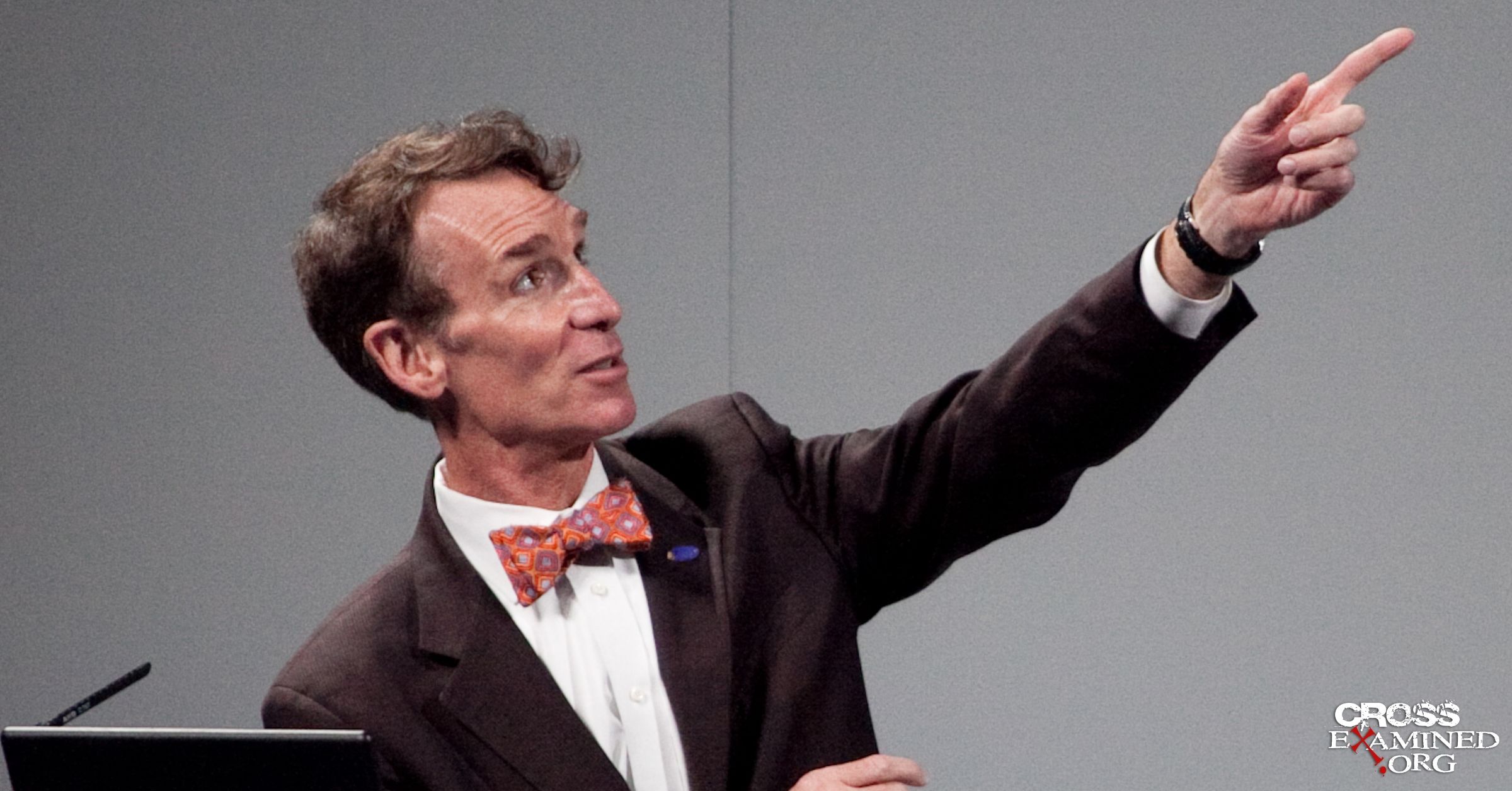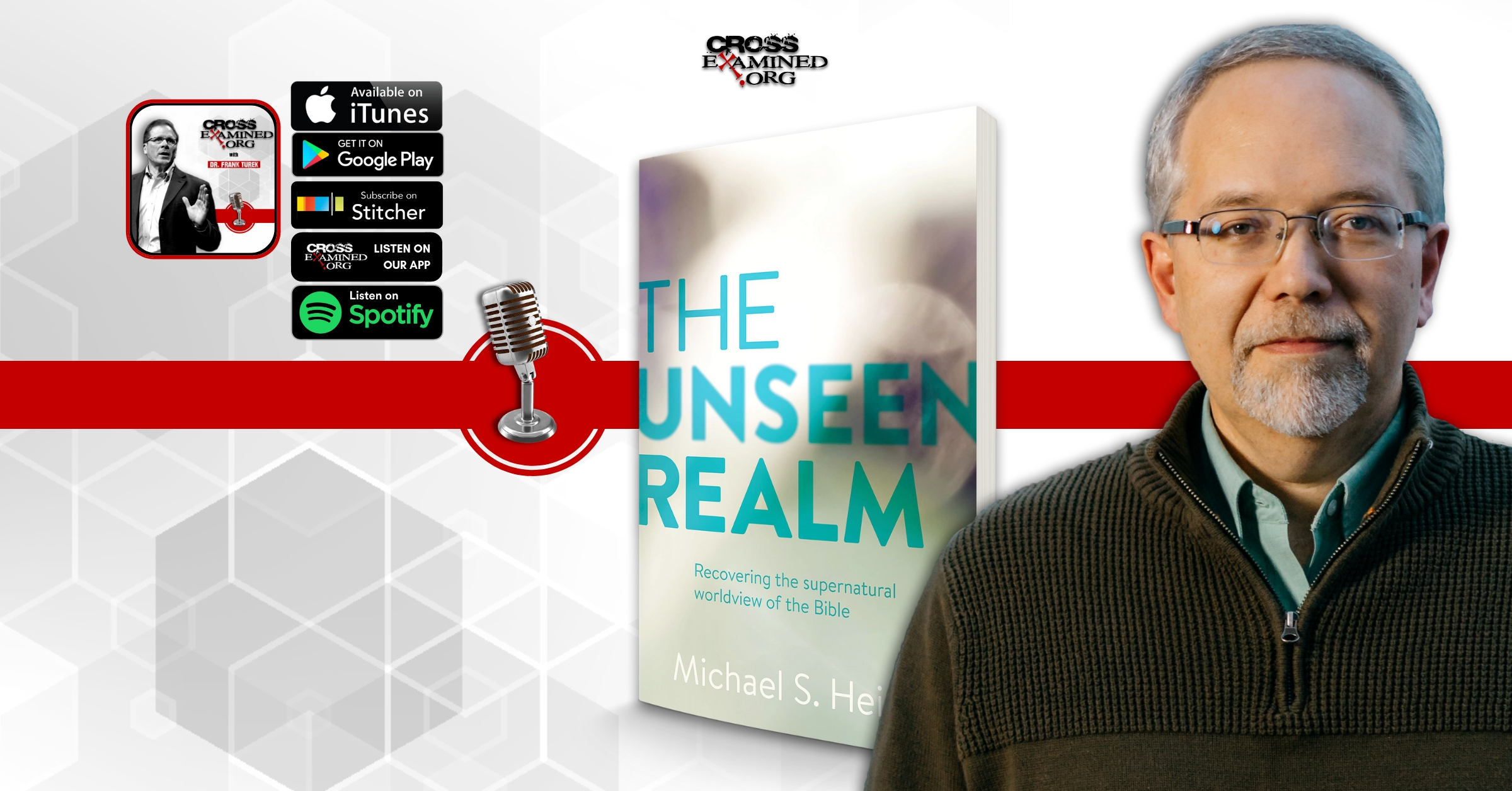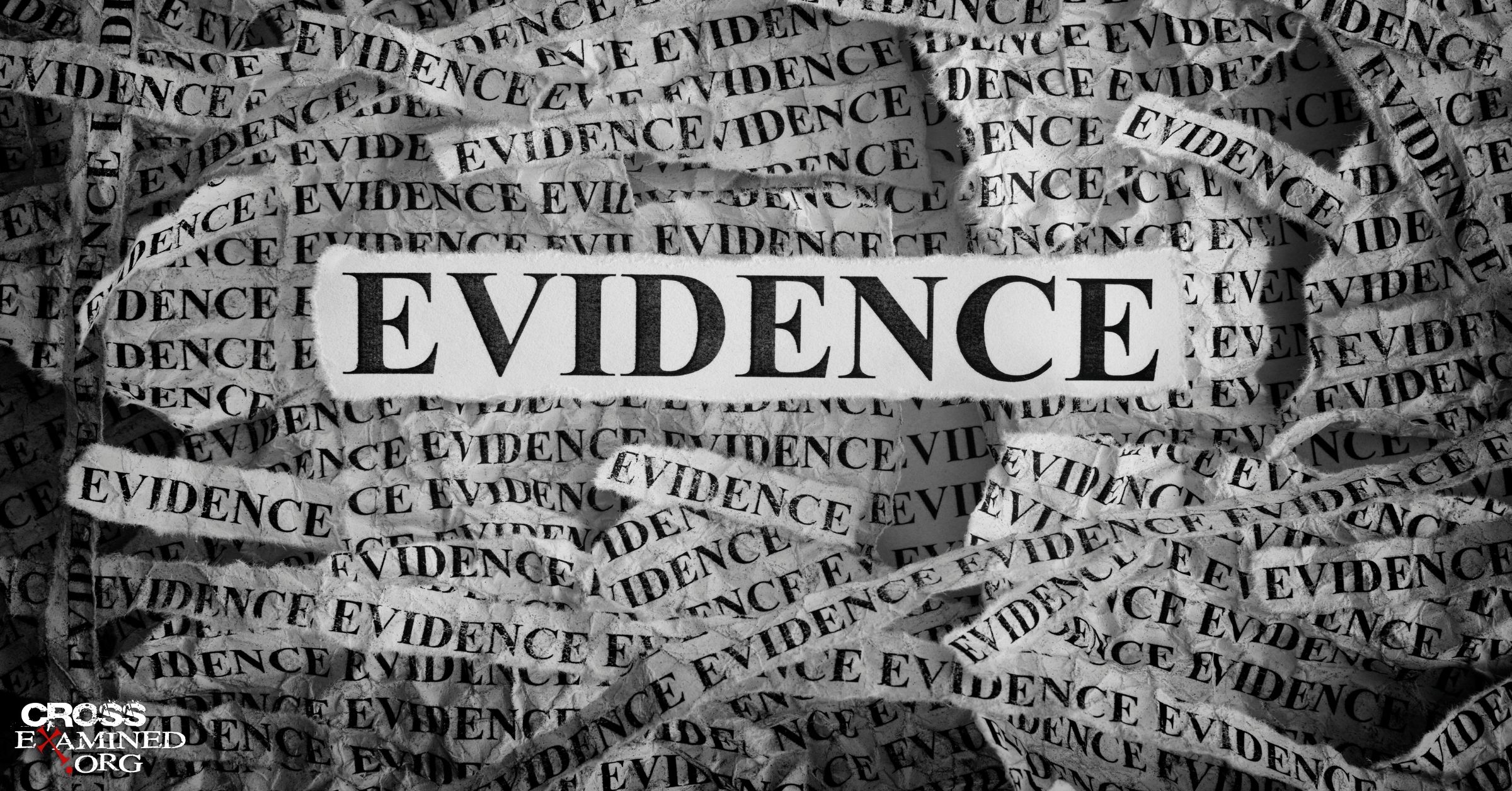Bill Nye, “The Science Guy” used to host an enjoyable and informative TV program for kids. In the last few years, however, Bill Nye has entered into a different realm. Apparently, he fancies himself an arbiter of all truth; the man who can quite literally save the world. But if you have any interest whatsoever in seeking that truth in a coherent, consistent, intelligent way, please watch this two-and-a-half-minute video. As you do, think about what he is saying. And don’t just focus on his defense of Evolution. Listen to his method of reasoning. It really is beyond me how someone who is considered a scientific sage could ever deliver such a rambling string of nonsense. But he doesn’t stop there. He goes on to admonish anyone who dares to disagree with him. And if you do, he wants you to shut up and leave the education of your children to real scientists… like him.
The Actual Bill Nye
There are a few facts you should know about Mr. Nye that are directly applicable to the content of this video. For starters, one would think that the media’s favorite “science guy” would be … Oh, I don’t know … an actual scientist. In fact, given the topic of this video, we might assume that our “science guy” would have some kind of background or advanced degree in the biological sciences. Bad assumption.
Bill Nye has nothing of the kind.
Mr. Nye’s education consists of a B. S. in Mechanical Engineering from Cornell University. While he was a student there, he took an astronomy class from Carl Sagan. Thus ends the list of Bill Nye’s scientific credentials.
After college, Nye was hired by the Boeing Aircraft Company in Seattle, Washington. There, he developed a hydraulic pressure resonance suppressor. But that wasn’t what gained him his notoriety. His real fame came after he won a Steve Martin look-alike contest and started doing stand-up comedy in Seattle nightclubs in 1978. Since then, he has received two Honorary Doctorate Degrees. But these weren’t awarded for scientific work. They were conferred on him for giving a couple of college commencement addresses after he became “Bill Nye, The Science Guy.”
You can’t make this stuff up.
Ridicule Is Not an Argument
I want to be fair here. Just because Bill Nye’s resumé as a “science guy” is lacking, it doesn’t mean we should dismiss him out of hand. We need to look at his arguments. But we also need to recognize the difference between an argument and an assertion. Anyone can make assertions. But no one should accept those assertions unless they are supported by evidence, logic, and sound reasoning. Mr. Nye gives none of these. He simply offers a diatribe that completely collapses when you take the time to think about what he’s saying. So, let’s look at Mr. Nye’s case.
What Does He Mean by ‘Evolution’?
The “science guy” starts off by lecturing us about how ridiculous it is to not believe in “evolution.” The problem is, he never defines what he means by the word. Does he mean that species change and adapt to the environment? If so, I don’t think I’ve ever heard of a single person who doesn’t believe that. But there are several other definitions of evolution. Which one must we accept?
Let’s assume that Mr. Nye subscribes to the most comprehensive definition of evolution. This is what I refer to as Big ‘E’ Evolution. It’s the idea that all life is the result of a purposeless, materialistic process that began by a random accident. That process can account for every imaginable life form, from the first self-replicating, single-celled organism to you and me.
Let’s break down his argument.
Truth Doesn’t Depend On Geography
First, he offers us this:
“Denial of evolution is unique to the United States … we are the world’s most advanced technological society … people move to the United States because of our general understanding of science.”
This first assertion is baseless and demonstrably false. I know of plenty of folks who live all over the world who do not accept ‘Evolution.’ They do so because they have not seen any credible evidence to support the most comprehensive view of evolution Mr. Nye subscribes to. But let’s say Mr. Nye is correct. Let’s pretend the only people who don’t believe in Evolution are Americans. What does this prove?
Nothing.
Where someone lives does not determine the truth content of what they believe. And the claim that people immigrate to the United States because of our general understanding of science is ridiculous on its face.
Denying Evolution Holds People Back?
But what of Bill Nye’s second assertion? Here, he claims that:
“When you have a portion of the population that doesn’t believe in Evolution, it holds everybody back.”
How, exactly, did Mr. Nye come to this conclusion? My undergraduate education is in Aerospace Engineering. I learned how to design airplanes and then how to fly them. I don’t accept Evolution. So how is it that I am “holding everybody back”?
To show the absurdity of it, let’s turn this one around. Suppose I claimed that those who do accept Evolution are holding everybody back. Would that be a valid argument against Evolution? Not in the least.
Misapplying Metaphors
So far, Mr. Nye’s comments have only demonstrated some flaws in basic logic. But then he takes things further and detonates a suicide vest on any trust we should have in him as a “scientist.”
“Evolution is the fundamental idea in all of life science … [Not believing in it] is analogous to doing geology and not believing in tectonic plates … you’re just not gonna get the right answer. Your whole world is just gonna be a mystery instead of an exciting place.”
Whatever one thinks of the concept of Evolution, there is one fact about it that we all agree on. Evolution is a process that explains the emergence and diversity of life on Earth. It is a noble attempt to explain how life emerged from the chemical elements that existed on the early Earth. It is a theory about how those chemicals combined and interacted with one another to produce complex biological systems that live and grow and reproduce.
The heart of Evolution is a process, not the parts that are used by the process.
So, let’s look at Mr. Nye’s comments in that light. He mentions tectonic plates. Tectonic plates are enormous slabs of rock in the Earth’s crust that slide and rub against one another to cause earthquakes. Geology is the study of the process that moves those plates around. So, Mr. Nye is confusing the plates with the process that moves them. He doesn’t seem to understand that he is equating completely non-analogous categories of things. Parts are physical things. But the processes that act on those things are something completely different. It seems to me a “science guy” would comprehend the difference.
A “Complicated” World
Building on his last point, Bill Nye begins his transition to questioning the character and motives of those who disagree with him;
“Once in a while, I get people who don’t really — who claim — they don’t believe in evolution. My response is, ‘Why not?’ Your world just becomes fantastically complicated when you don’t believe in evolution.”
Notice that Mr. Nye believes that no one could really disbelieve in Evolution. They only “claim” to do so. And he never offers any examples of the responses he receives to his “Why not?” question. Who is he asking? Why does he dismiss them? We can’t really know how to evaluate their answers unless we know the actual reasons they are giving. The fact that Mr. Nye doesn’t accept their responses is hardly a reason for us to reject them. After all, we’ve already demonstrated that his reasoning in support of Evolution is flawed.
But there’s another question. Why would someone’s rejection of Evolution make their world “fantastically more complicated”? Once again, the conclusion does not follow.
Using Young Earth Creationist Logic
Mr. Nye’s next point is pretty fantastic all by itself. And let me be clear. I am not taking a stand one way or the other about the age of the universe here. I am simply pointing out how Mr. Nye is using the same logic as a young earth creationist when he says this:
“Here are these ancient dinosaur bones … radioactivity … distant stars … the idea of deep time … billions of years … if you try to ignore that your worldview just becomes crazy.”
Here, Mr. Nye says that rejecting Evolution is the equivalent with believing in a young universe. Or, conversely, believing in an old universe means that you accept Evolution. But, once again, he is confusing categories.
Evolution is a theory about biology. The age of the universe comes from the study of cosmology. These are completely different areas of study! All one would have to do to show that Mr. Nye’s assertion is false is declare themselves to be either an “old universe, non-Evolutionist,” or a “young universe Evolutionist.” Voila!
This is the same false equivalence most young-Earth creationists use against those of us who believe the universe is old. I wonder how Mr. Nye would react if someone pointed out to him that his thinking is exactly like the young-Earth creationists he abhors.
Questioning Your Parenting
Finally, Bill Nye makes it personal. He wants you to know that if you disagree with him, your status as a parent is in question:
“I say to the grownups, if you want to deny evolution and live in your world that is completely inconsistent with the universe, that’s fine … but don’t make your kids do it … because we need them … we need engineers who can build things and solve problems …”
Once again, Mr. Nye demonstrates his failure to understand basic logic when he ties belief in Evolution to our ability to produce “engineers who can build things and solve problems.”
It seems fairly obvious that one can be a perfectly competent airplane designer and not have any opinion about Evolution. In fact, a highly competent engineer can be completely ignorant about the concept of Evolution. Mr. Nye proved that himself when he designed a hydraulic pressure resonance suppressor for Boeing.
But beyond that, Mr. Nye has stepped out of a scientific critique (if you could consider him to have ever been inside one). In his arrogance, he assumes he has the right to tell you what you should be allowed to teach your children.
The Totalitarian Impulse
This is the totalitarian impulse. It’s a mindset that thinks some people can determine what other people should be allowed to think. Those of us who honor scientific objectivity, free thought, and academic tolerance need to recognize this kind of talk when we hear it. People who think like this are the most intolerant kinds of people in the world. They are destroying the concept of free thought in the academy. It is intellectual dishonesty writ large. And it can become dangerous for those who don’t think the “right way.”
Mr. Nye insists that you need to believe in Evolution. If you don’t, you must be overcome because our society needs “… scientifically literate voters and taxpayers.”
Be careful what you wish for, Mr. Nye. If scientific literacy suddenly became a prerequisite for voting, it looks to me like a certain “science guy” would have to stay home on election day.
Bob Perry is a Christian apologetics writer, teacher, and speaker who blogs about Christianity and the culture at: truehorizon.org. He is a Contributing Writer for the Christian Research Journal and has also been published in Touchstone, and Salvo. Bob is a professional aviator with 37 years of military and commercial flying experience. He has a B.S., Aerospace Engineering from the U. S. Naval Academy, and a M.A., Christian Apologetics from Biola University. He has been married to his high school sweetheart since 1985. They have five grown sons.
Original Blog Source: http://bit.ly/30bWkij











